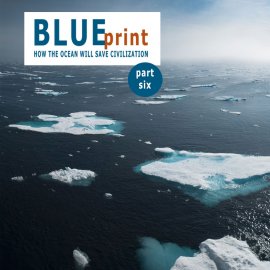Climate Equity
-
English
-
ListenPause
[intro music] Welcome to World Ocean Radio… I’m Peter Neill, Director of the World Ocean Observatory. We continue to battle over climate change as reality and determinant of our future. The United Nations Framework for Climate Change was a first aggregation of scientific evidence that had been building for decades, a collective response that though various reports, research, and policy iterations brought the global community to Paris to make a first international commitment of a strategy for reduction of emissions from the burning of fossil fuels to a level defined as necessary simply to break a pattern of increase and consequence that was optimistic at best, not altogether equitable in its impact on the developing world, but nonetheless a significant collaboration among nations taking the problem seriously at last. Until it began to erode around the edges, first, and most tragically, by the withdrawal of the United States by the newly elected President Donald J. Trump in response to pressure by the oil and gas industry, its political enablers, and the minority opposition by climate deniers indifferent to the science and unsympathetic to the impacts on the economy and public health of the American population, Europeans, and those in other nations most victimized by a worldwide distribution of consequence. What seems like a necessary and most welcome international collaboration was fractured, partially stalled, and left to those nations most aware of the challenge and most progressive in response. Europe remained committed, and even China, the other major world economy, was paying attention, reducing its massive reliance on burned coal, building hydro-electric generators and nuclear facilities and other energy options, while the US descended into a regressive position that, ironically, even the major industry players had begun to acknowledge as uneconomical stranded assets, and to explore alternatives. As if this was not dangerous enough, the Coronavirus, possibly a function of climate factors, emerged as a global pandemic with devastating impact on production and globalization of trade, both manufactured goods and agricultural products, a system that lay at the heart of world exchange and economy. The overlap of indifference and inadequate reaction to rampant disease stood the world order on end, again with the United States as the most egregious agent of failed reaction and governance. No nation has been subsequently immune and the political and social outcomes have become more and more evident and measurable in death, pandemic infection, unemployment, market instability, and decline of the industrial and political institutions on which any equitable structure for world security is built. So, suddenly, unexpected forces were released with unpredictable outcomes that put into question not only historical premises but also conventional reactions. We had feasted on a banquet of sour grapes, and now our teeth were set on edge. Economists had envisioned such events as “black swans,” an aberration of circumstance that created a new challenge beyond historical performance, an extreme, novel extension of a known phenomenon. But this was something new, something beyond theoretical prediction, a “green swan” event, previously unimaginable and entirely outside any parameter of prediction or considered response. Climate change, compounded by disease, at a scale heretofore unknown in both degree and distribution, was beyond the experience and capacity of governance, and the old tools for economic adjustment and social response, the prior application of stimulus and compartmentalization, were surpassed by extension and inexplicability. Are there moments in time when the world stands still? Is our globalized planet now so integrated as a socio-politico-economic space that there is now no meaning to nationality and ideology that can withstand these new hyper-phenomenal forces? Have we passed the tipping point when the balance of our experience and knowledge is not just challenged, but upset and inundated by pandemic change and we are paralyzed by ignorance and inaction, poised on the verge of collapse and descent into caterwauling chaos? Paradoxically, there is equity in this condition, in that regardless of origin, rich or poor, north or south, east or west, we are all equally in this disconnected elemental mix, joined psychologically in angst and apprehension. How do we understand this? Do we need a metaphor to encompass the idea? If so, consider the ocean as just such a space in time, where order and disorder mix, known and unknown combine, and all things are equal and unequal simulltaineously, and subject to infinite dimensions, consummate forces, lightless dark and nurturing light. We will discuss these issues, and more, in future editions of World Ocean Radio. [outro music]
This week on World Ocean Radio: part six of the multi-part BLUEprint series. In this episode–Climate Equity–we talk about the continued devolving U.S. response to the Paris Climate Accord and the potential pitfalls of indifference, inadequate reaction and failed governance. The "BLUEprint Series: How the Ocean Will Save Civilization" outlines a new and sustainable path forward, with the ocean leading the way.

About World Ocean Radio
Since 2009, a weekly 5-minute podcast covering a broad spectrum of ocean issues from science and education to advocacy and exemplary projects. World Ocean Radio, a project of the World Ocean Observatory is available for syndicated use at no cost by college and community radio stations worldwide. Contact director@thew2o.net if you are interested in becoming an affiliate or know of a radio station that should be broadcasting these episodes each week.
Image
William Bossen
Resource from this Episode
- Paris Climate Agreement
- On the U.S. Withdrawal from the Paris Climate Agreement (state.gov)
- Login to post comments



